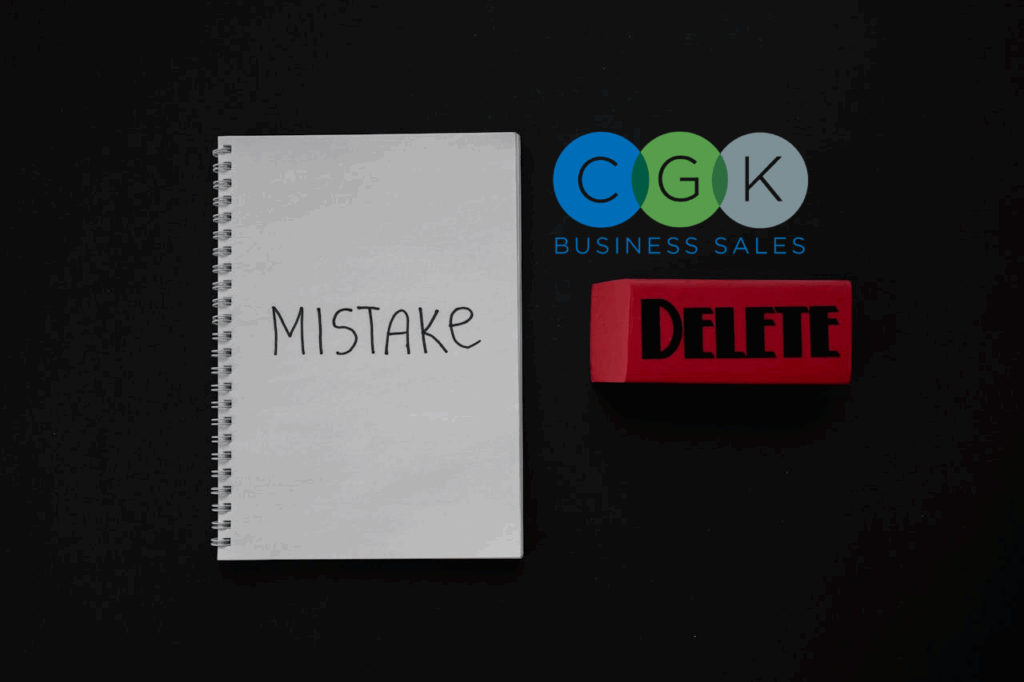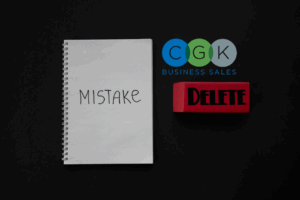1. Going to Market Without a Proper Valuation
One of the most common — and costly — mistakes to avoid when selling a business is skipping a professional valuation. Too many owners either guess at what their business is worth or rely on rules of thumb, online calculators, or hearsay from peers. While these shortcuts may provide a rough idea, they rarely reflect the true market value of a business, especially in the main street and lower-middle-market space.
The danger of underpricing is obvious: owners leave money on the table. But overpricing can be just as damaging. An inflated asking price can drive serious buyers away, prolong the time on market, and ultimately force the seller to accept a discounted offer after months of wasted effort.
The U.S. Small Business Administration notes that preparing for a sale requires clear, reliable financial information and a fair market assessment to set expectations appropriately. Without small business exit strategy planning, owners risk undermining the very transaction they’ve worked years to build toward.
The solution is straightforward: invest in a professional, data-driven valuation before going to market. This process considers historical earnings, normalized cash flow, industry multiples, buyer demand, and current capital market conditions. For small and lower-middle-market companies, this kind of valuation ensures the business is positioned correctly from the start, giving owners credibility and confidence in negotiations.
At CGK Business Sales, we emphasize that valuation is not just about a number — it’s about strategy. Understanding where your company stands today allows you to highlight its strengths, address weaknesses, and market it to the right buyers. Proper valuation eliminates guesswork and sets the stage for a smoother, more profitable sale.
2. Not Preparing Financials and Operations in Advance
Another of the major mistakes to avoid when selling a business is entering the process with disorganized records or incomplete financials. Buyers expect transparency. If your books are messy, expenses are poorly documented, or operations are not clearly defined, it creates doubt. And doubt, in the buyer’s mind, translates into risk — which often results in lower offers or deals falling apart during due diligence.
BizBuySell, which reports small business sales data and insights on a quarterly and yearly basis, has reported that poorly documented financials remain one of the top reasons small business sales collapse. Buyers want assurance that the earnings you present are real, repeatable, and sustainable. If your records can’t support that, they’ll either walk away or use it as leverage to negotiate down the price.
Operational inefficiencies can be just as damaging. Businesses that depend heavily on the owner for day-to-day decision-making are harder to sell, because buyers see a fragile transition ahead. Likewise, a lack of documented processes, employee training systems, or customer retention strategies makes buyers question how the company will perform once ownership changes hands.
To avoid this mistake, owners should begin preparing their business at least 12–24 months before going to market. That means cleaning up financials, tightening expense tracking, formalizing processes, and ensuring key employees are in place and trained. The goal is to demonstrate that the business is not only profitable today but also transferable to a new owner with minimal disruption.
CGK works closely with owners to help prepare their businesses for sale in ways that instill buyer confidence. By presenting clean books, strong operations, and a clear growth story, sellers dramatically increase their chances of closing at favorable terms. Proper preparation reduces buyer skepticism and ensures the business withstands the scrutiny of due diligence.
3. Waiting Too Long to Sell
Another of the most damaging mistakes to avoid when selling a business is waiting too long to go to market. Many owners believe that their company will always be worth more “next year,” or that they should wait until conditions improve. Unfortunately, business valuations are cyclical, and buyers are focused on earnings trends, not potential rebounds.
When revenues or profits begin to decline—or when industry cycles shift downward—multiples usually compress. Buyers pay premiums for stability and growth, not for businesses that appear to be peaking or heading into a downturn. By waiting, some owners miss the most favorable exit window.
Market timing matters. Consider the Federal Reserve’s recent signals on interest rates: when borrowing costs fall, buyer activity typically rises, and valuations increase. Conversely, when rates climb, deal flow slows and multiples shrink. Owners who align their exits with favorable market conditions tend to maximize value.
The reality is that you don’t get to choose when buyers are most active—you only get to choose when you’re prepared. CGK Business Sales helps owners evaluate the market cycle, understand buyer appetite, and decide when it’s truly the right time to sell. Acting proactively, rather than reactively, can make the difference between a strong outcome and a disappointing one.
4. Trying to Sell on Your Own
It’s tempting for owners to try to sell a business on their own, especially when they see the commission or advisory fees involved. But this is one of the most dangerous mistakes to avoid when selling a business. What may seem like a cost-saving move often ends up being the most expensive mistake of all.
Without an experienced advisor, owners often misprice their businesses, fail to find the right buyer pool, or give away value during negotiations. Worse, they may accidentally expose sensitive information to competitors or unqualified buyers. Selling a business is not like selling a house—it involves complex legal, financial, and operational considerations that most owners encounter only once in their lifetime.
A structured, competitive sale process typically results in higher offers and better terms. For example, by marketing to multiple buyers simultaneously, advisors like CGK can create competitive tension that drives up value. On the other hand, a DIY sale often involves negotiating with a single buyer, which limits leverage and usually reduces the final price.
CGK’s closing ratio of over 90%—compared to the industry average of around 20%—demonstrates the impact that experience, structure, and buyer networks can have. Attempting to go it alone may seem like a shortcut, but it’s almost always a detour that costs time, money, and peace of mind.
5. Focusing Only on Price Instead of Terms
Finally, one of the most overlooked mistakes to avoid when selling a business is fixating only on the purchase price while ignoring the terms of the deal. On paper, an offer may look strong—but once you factor in deal structure, working capital requirements, earnouts, and contingencies, the “headline number” often shrinks dramatically.
For example, a buyer may offer $10 million for a business, but structure it so that only $6 million is paid at closing, with $4 million tied to an earnout over several years. If performance dips slightly, the seller may never see that additional money. Similarly, aggressive working capital adjustments can reduce the final payout, even when the initial offer seemed attractive.
Experienced advisors know that terms often matter as much as price. Sellers should evaluate not just the amount being offered, but also how and when they will receive it. Cash at close, escrow terms, seller notes, and earnouts all impact the true value of a deal.
CGK Business Sales negotiates with a focus on both price and terms, ensuring that our clients maximize their outcomes while minimizing risks. By understanding the fine print, we help owners avoid costly surprises after the letter of intent has been signed.
Setting Yourself Up for a Successful Exit
Selling a business is one of the most important financial events of an owner’s life. Unfortunately, many entrepreneurs fall victim to the same avoidable pitfalls: skipping valuation, neglecting preparation, waiting too long, trying to sell without guidance, or ignoring deal terms. These mistakes to avoid when selling a business can cost owners millions of dollars and years of hard work.
The good news is that with the right preparation and professional support, you can avoid these errors and achieve a successful outcome. A well-prepared business with clean financials, strong operations, and a clear valuation is far more attractive to buyers. Pair that preparation with expert representation, and you put yourself in the best position to capture maximum value.
At CGK Business Sales, we specialize in guiding owners through every stage of the process, from valuation to closing. Our structured, confidential approach ensures your business is marketed to the right buyers, positioned for success, and negotiated with precision.
If you’re considering an exit in the near future, don’t wait until the market shifts or your performance declines. Take the first step today: obtain a professional valuation and start planning your strategy. With CGK by your side, you can avoid the common mistakes, protect your legacy, and maximize the value of your life’s work.


